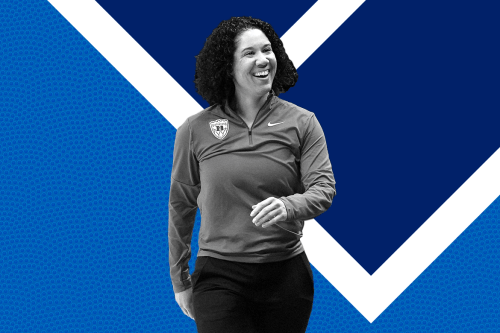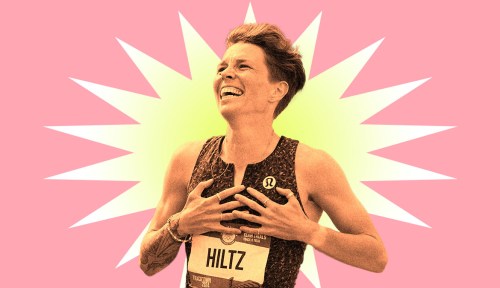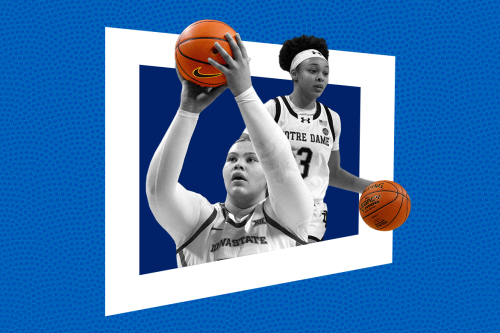What did it take for Allie Wilson to make her first Olympic team? If you ask her, it wasn’t a physical breakthrough on the track—it was the work she’s been doing “upstairs.”
Experts in This Article
Olympic 800-meter runner
Olympic heptathlon athlete
director of The Optimum Performance Program at the University of Nevada, Las Vegas
Boston-based sports psychology coach, licensed mental health counselor, and founder of E Saul Movement
New Balance-sponsored marathoner and two-time Olympian
Olympic 1500-meter runner
You see, for years the 800 meter-runner felt like she was struggling to break through as one of the best. “We hit a point where I knew deep down that I wanted it so bad, but I never actually thought I was going to have it,” Wilson told Citius podcast after her second place finish at U.S. Olympic Trials in June. “I dealt with a lot of self-doubt, a lot of confidence issues; I was always putting other people above me on this pedestal.”
Even though she was skeptical, Wilson started working with mental coach Bianca Martin. “I always thought mental work was so phony,” she says. “I don’t know why I was so anti. I just didn’t think it would make a difference, and I never thought it would be as important as what I was doing on the track.”
While we often focus on the physical skills and talents of our favorite Olympians, there’s a piece of the puzzle we can’t always see: their mental training. “Bianca has a way of making me feel calmer, and more confident,” Wilson says. “I knew something was missing, and she was changing that for me.”
Wilson is far from alone. In order to stay competitive, it’s become nearly essential for top athletes to utilize sport psychologists and performance coaches, says clinical psychologist Bradley Donohue, PhD, director of The Optimum Performance Program at the University of Nevada, Las Vegas.
Establishing a routine of mental wellbeing practices has helped many elite athletes in a big way. The best part? It can help you, too. “A major focus of sport psychology concerns helping athletes develop skills to optimize the way they think, perceive, and act in performance situations,” Dr. Donohue says. “But these skills are also relevant to non-sport performance situations.”
Here’s an inside look at some of the tools four Team USA athletes tapped to find their edge and earn a trip to the 2024 Paris Olympic Games. Whether you’re gunning for a promotion, training for a marathon, or simply striving to be the best parent, friend, or spouse you can be, you’re going to want to take notes.
1. Flip the script
To combat her nerves and negative thinking pre-race, Wilson and her coach started a unique ritual: a “burn ceremony.”
“Bianca was like, ‘Write down every single thing that you’re thinking that’s negative, without saying it out loud,’” Wilson explains. “Then she said, ‘Okay, now write the opposite on the other side of the paper.’ So I had to counter each thing that I wrote down. So if it was ‘I’m nervous,’ it became ‘I’m excited’’; ‘I don’t want to do this’ became ‘I want to do this.’”
When she was done, Wilson ripped them out of her journal. “We burned the negative one as I said the positive one out loud—so I never said the negative ones out loud. It was just really freeing, to get rid of those bad negative thoughts.”
We’re not always aware of the thoughts we’re having—or, how those thoughts are truly affecting us. “Negative thoughts, just like positive thoughts, are contagious, meaning they have a tendency to spread quickly,” Dr. Donohue says.
“The brilliance of this exercise is there is a focus on first becoming aware of the negative thinking patterns so each thought can be subsequently optimized,” he says. “By being prompted to record ‘all’ thoughts, this process helps athletes appreciate the differences between optimal and non-optimal thinking.”
While Dr. Donahue says the actual burning is probably more symbolic than anything, “the important aspect of this approach is that there is an active process to replace each non-optimal thought with a positive one.”
2. Narrow your focus
Like life, one thing is fairly certain when you run a marathon: It’s not always going to feel easy. “In most of the marathons I’ve run, I’ve had something go wrong or hit a rough patch,” says New Balance-sponsored marathoner and two-time Olympian Emily Sisson. “In those moments, it’s easy to think, ‘This is so hard’ or ‘This is not going to be my day.’ But most of the time I’ve been able to make it out and have a really good or a decent day.”
Sisson credits a simple, yet super-effective mental tool for getting through those tough spots. “I’m very task oriented,” says Sisson. “In races and training in general, I try to focus on each task as it comes and not get too far ahead. That’s really key and important for me. As a race unfolds, I feel like overall I run better, feel better, and enjoy it more when I’m not thinking too far ahead.”
There’s a reason Sisson feels better taking this approach, explains Boston-based sports psychology coach and licensed mental health counselor Emily Saul, LMHC, founder of E Saul Movement. “Your brain is always trying to assess the ratio between what the challenge in front of you will demand and what resources you have to bring to the challenge,” she says. “If your brain assesses the challenge as being big, it will activate fear and the drive to protect you rather than rise to the challenge.”
This skill of breaking things down into smaller pieces is a way of managing that brain response. “When the challenge she focuses on is always a small, simple task, her brain has no problem assessing that the demand is well within her ability,” Saul says. “By guiding the part of your brain to only focus on one piece at a time, it doesn’t get overwhelmed. This leads to more consistently and more effectively being able to perform at your full capacity.”
3. Keep it consistent
Just like you have to run steady mileage to improve at running, Sisson does just as much work on her mental game. “It didn’t come overnight and it’s still something I always have to work on,” she says. “I have a therapist I talk to once a week. And my husband is a therapist, too, so sometimes I’ll pick his brain on how to reframe things or put a more positive spin when I feel any sort of pressure or negativity.”
Nikki Hiltz is another track star who reaped the benefits of persistent effort. Here’s “some of the BTS mental work I put into these Olympic Trials,” Hiltz shared after a thrilling first-place finish at Olympic Trials:
- Met with my therapist once a week
- Kept randomly adding to my notes app things that motivate me, calmed me down, or instilled belief
- Journaled positive self talk and manifestations
- Meditated for 100 days straight
“The simple takeaway is that what you practice consistently gets perceived by your brain as ‘normal’ and predictable, and therefore safe and reliable,” Saul says. “This safety helps provide a foundation from which your brain and body can work together to allocate lots of energy to maximizing your performance and rising to your potential.”
Gold Medal Couple Tara Davis-Woodhall and Hunter Woodhall Talk Marriage, Motivation, and Their Next Chapter With Nike

Coach Kara Lawson Wants You to ‘Handle Hard Better’—and Here Are 3 Ways to Do Just That

JuJu Watkins Leaves March Madness With ACL Tear—and This Knee Injury Is More Common Than You Think

“By guiding the part of your brain to only focus on one piece at a time, it doesn’t get overwhelmed. This leads to more consistently and more effectively being able to perform at your full capacity.” —Emily Saul, LMHC
4. Prime your mind
The women’s heptathlon is one of the more unique events in track and field, testing athletes in seven different events over two days. It’s demanding, both physically and mentally.
After a gut-wrenching fall at the last Olympic trials and a knee surgery last year, Adidas athlete Anna Hall was determined to make this year her year. And she did, winning gold in the 2024 U.S. Olympic Trials to make her first Olympic team.
Hall’s physical talent is obvious, but in reading her “spark notes” from trials, you catch a glimpse of the powerful mental tools she’s putting to work behind the scenes.
“Today I will become an Olympian. I am in control of my body, it does what I tell it,” is seen scribbled alongside detailed cues and notes for each of her events.
spark notes from the weekend ❤️📝 pic.twitter.com/lpxHWtHmey
These simple words have a powerful effect: According to a study published in the Journal of Applied Sport Psychology1, when athletes envisioned themselves achieving a goal before a competition, it lowered their anxiety, increased their confidence, and boosted their performance.
Dr. Donohue loves to see it. Like Hall, he teaches the athletes he works with to sandwich their task-oriented instructions [for example, Hall stating “forward big arms”] with motivational words [like “LFG!” or “This is my happy place, be present!”]. “The first motivational word primes the athlete to focus on the instruction, and the second motivational word reinforces the athlete for using the instruction,” he says. “These motivational sandwiches are usually best used before or during practices and competitions, particularly when negative thinking patterns have occurred in the past.”
5. Focus on yourself
The women’s 1500-meter final at this year’s Olympic Trials was one for the ages. With 200 meters to go, nearly every runner was still in contention. But it was Hiltz who surged ahead to win, clocking the second-fastest 1500-meter time ever by an American.
In Hiltz’s pre-race journal entry, they all but called how the race would eventually play out:
“I am going to do it. I’m going to run a race I’m proud of. I’m going to [hang out] in 4th the entire race and then get it DONE the last 200m. And by get it done I mean compete for every single spot and run an incredible last 100m. This is championship racing. This is what I live for. I know what going all out that last 100 feels like. Today’s felt like a 6/10 and I ran 4:01. I am so strong right now. When I ran 3:59 at PRE I did double thresholds the same week. I am so speedy right now. I ran a 2:35 1K two weeks ago splitting 60/65/30 at 7,000 feet. I can do this. I have all the tools. Now it’s just time to execute.”
“It’s so powerful to see someone use this kind of self-talk and intention-setting to seem like they ‘manifested’ it right into reality,” Saul says. “The most important thing to point out about this is that yes, they absolutely did execute on what they planned to do, and the specific things that they named were elements that they had full influence over.”
Go back and reread it. Nothing about Hiltz’s plan is dependent on anyone else in the race. “Compete for every single spot” and “run an incredible last 100m” is a measure of their own focus, effort, and feeling. “It’s important for the observer to remember that this was measured internally by that athlete–only they can say if they ran an incredible last 100m—because this is compared to the last 100m in their own racing history, not compared to the other runners on the track that day.”
This might be a subtle distinction, but Saul argues it’s one of the most pivotal when it comes to setting specific goals or intentions. You can’t just tell yourself “I’m going to win this race” or “I’m going to beat them for this promotion” over and over again and expect it to come true.
“You cannot control an outcome, especially when the outcome is influenced by other people,” Saul says. “But what you do have massive influence over is what you think, what you focus on, which actions you take, and how you choose to feel in an experience–and all of these play a role in how your body is able to perform.”
6. Separate skill from self-worth
Leading into a make-or-break race like the Olympic Trials is a ton of pressure. Only three women make the team in each event.
“I’m racing literally the best athletes in the entire country. I knew how badly I wanted it, but I knew I didn’t want it any more than everyone else did,” Wilson says. “I really had come to terms with not making it beforehand. At the end of the day, this is just another meet and I cannot put my worth on whether or not I make this team. I think that helped me a lot.”
Sisson can relate. “When I was younger, I probably felt like more of my self-worth was on the line,” she says. “And now I’m like, no, you really have nothing to lose here. Reminding myself of that has been pretty important.”
“This is one of my favorite concepts because when an athlete can disconnect these things—or as I like to think of it, to put them in the right sequence—it’s absolutely game changing,” Saul says.
Here’s the common sequence Saul often sees: “If I hit that big goal, then I’ll feel good about myself.” Or “when that achievement happens, then I’ll have proven myself…then I’ll be enough.”
“This creates an emotional dynamic of everything being on the line with each performance,” Saul says. “It can’t possibly be ‘just a race’ if whether you’re a lovable, worthy person is hanging in the balance.”
But what if you could shift that sequence just a bit? “There’s so much more joy in pursuing your potential when you feel secure about yourself first,” Saul says. “Knowing that your worth is unshakable, you can just go out and see what’s possible.”
It’s not just about making your sense of self–your identity, your worth, your value, your lovability–independent of your accomplishments; it’s accepting that those qualities are inherently a part of you, Saul says. “That enables you to eagerly and excitedly use them as a launching pad toward what you’re capable of doing, rather than operating out of fear and worrying that you’ll never be enough without proving it first.”
7. Bring others along with you
“Heptatlon is a team sport!” Hall wrote recently on social media. “My people have my back every step of the way & we can’t wait to do it all again in Paris soon.”
Hall’s not alone. Watch any athlete who wins a medal in Paris, and you’ll likely find them thanking their family, friends, spouse, coaches, and teammates. In fact, Dr. Donohue and his colleagues conducted a study and found that positive outcomes were more likely to occur when family, coaches, and teammates attended a mental wellness program with their athletes.
None of this surprises Saul. “Human beings need each other,” she says. “We just don’t operate best as solitary beings. Physically, neurologically, emotionally, socially, we need other people to develop and grow to our fullest potential.”
What’s more, it’s actually much harder to work on growth on your own—especially when it comes to your mindset and overall mental health. Why? “It’s impossible to have a full and accurate perspective of yourself at all times, so other people who care about you can offer perspective and insight that you often need when you are so deeply immersed in training or the pursuit of your goals.”
Not only does their support give you a helpful reference point and someone to bounce ideas off of, but Saul says even the simple act of sharing your thoughts and feelings out loud can be powerful. “It allows you to hear and reflect on them in a different way than when you only think or feel them internally. Ultimately, these people help you to feel seen, understood, valued, supported, safe, and better prepared to rise to the challenges in front of you, and all of this positively contributes to your ability to thrive, both in sport and in life.”
Bird, M. D., McEwan, D., Healy, L. C., & Jackman, P. C. (2024). Goal-setting practices in sport psychology: An investigation into practitioner experiences. Journal of Applied Sport Psychology, 1–25. https://doi.org/10.1080/10413200.2024.2331205
↩︎
Sign Up for Our Daily Newsletter
Get all the latest in wellness, trends, food, fitness, beauty, and more delivered right to your inbox.
Got it, you've been added to our email list.








